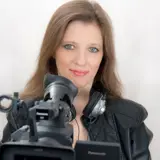Atlantic Division
Central Division
Southeast Division
Northwest Division
Pacific Division
Southwest Division
Interview with Rafael Aghayev, Five-Time World Champion of Karate

Marching in the opening ceremony of the Olympic Games should carry with it a feeling of pride and national patriotism. But for some athletes, the opening ceremony will give nothing but mixed feelings. This is because many athletes marching at the opening ceremony at the 2020 Olympic Games in Tokyo will march under the flag of another country, wearing a uniform that is not their own. When asked why, many of these athletes will claim that they represented a different country at the Games because of their nationality or heritage, but the truth is often a different story altogether. For many people, competing under the flag of another country is the only way that they could compete at the Olympic Games at all.
The Olympic Games is where the best athletes in the world compete. Why, then, have some of the world's most prominent national teams lost some of the most amazingly talented athletes? Why did American pole vaulter Giovanni Lanaro compete for Mexico? And why did fellow Americans Peter Callahan, Alexi Pappas, and David Torrence compete for Belgium, Greece, and Peru respectively?
Killian Hicks from The Odyssey Online has a theory. "Only half of the American track and field athletes who are ranked in the top 10 of their individual events earn more than $15,000 per year from the sport and governing bodies. Most of the nation's best athletes, who we want to represent us on the worldwide competition field, live way below the poverty line."
This problem is not unique to America. There are other countries facing the same problems: countries who don't invest enough funds in talented, sports-oriented youth. Meanwhile, there are plenty of other countries willing to pay good money to entice top-level foreign athletes. For example, Great Britain's Olympic team at the 2012 Games had 60 foreign-born athletes. Another example is Azerbaijan, which readily recruits foreign-born athletes. In fact, half of its 50-person national team at the 2012 Olympic Games were naturalized citizens born elsewhere.
Qatar frequently recruits athletes from Bulgaria and Kenya, and famously bought an entire eight-person weightlifting team from Bulgaria in 2000 in exchange for a little over $1 million and the promise of citizenship for all eight members. Just three years later in 2003, Qatar bought two Kenyan long-distance runners: Stephen Cherono and Albert Chepkurui, who changed their names to Saif Saeed Shaheen and Ahmad Hassan Abdullah respectively and joined the Qatari Olympic team.
The same trend holds true for every Olympic sport. The 2016 Olympic Games featured 11,000 athletes competing in 306 events under the banner of 206 distinct nations. But how many of those were competing under the "wrong" banner and wearing another country's uniform? For many athletes that do, it is because they are tired of trying to financially survive while training many hours a day, living hand to mouth and struggling to pay for travel expenses, equipment, uniforms, tournaments, nutrition, and training. Like all professionals, athletes should be free to make the most of their talents and be paid an appropriate wage commensurate with their skills and experience.
Who Will Represent Canada in 2020?
If possible, the financial situation for karate athletes is even worse. Karate was only officially recognized as an Olympic sport in August 2016, which means that the first Olympic participants have quit their day jobs to devote enough time to their training while facing difficulties putting together the enormous budget required to train and prepare for the upcoming Olympic Games. It is very likely that the most successful karate Olympians will be those who train professionally and receive a salary from their country over a period of many years. In Canada, this means that to potentially become one of the 60 elite karate athletes worldwide competing in the Olympic Games, there is a requirement for more clubs, more students, and more coaches. Canada is in a unique position, with an envious historical background, amazing coaches, and exceptional athletes. But, despite its many successes, Canada sorely lacks enough funding, referees, judges, and opportunities to participate in competitions.
Meanwhile, Azerbaijan boasts an amazing domestic karate team, arguably because the country invests in its athletes and pays decent salaries to their coaches. As an example, let's consider the case of the living karate legend Rafael Aghayev. Born in 1985, Aghayev began studying karate at seven years of age. Keen to support his passion for karate, Aghayev's parents invested their savings and sold their family jewels to cover the travel expenses for his first competition. His parents may have taken an enormous financial risk, but it would turn out to be a worthwhile one. After participating at his first national competition, Aghayev's talents were noticed and he was invited to train at one of the most famous sports clubs in Azerbaijan, Budokan, under the leadership and instruction of Fizuli Masayev.
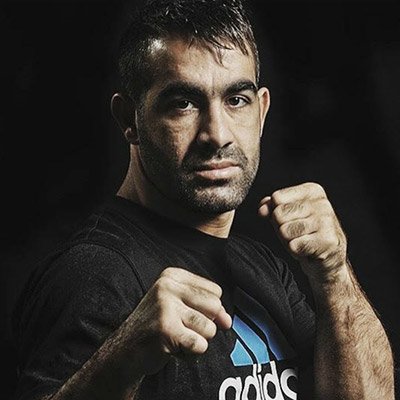
At just 12 years of age, Aghayev was invited to join the national team, becoming the youngest athlete extended this honor. 20 years later, he still represents Azerbaijan's national team and has now become the oldest member of the team. In 2007, Aghayev graduated from the Combat Sports Faculty at the Azerbaijan State Academy of Physical Culture and Sports as a trainer and instructor in karate. Now a 5th dan black belt, Aghayev was awarded the Order of Glory in 2008 for his achievements at the first European Games, as well as his enormous contributions to the development of karate in Azerbaijan.
As a part of the Azerbaijani National Team, Aghayev has spent much of his life focusing on the sport and concentrating his considerable attention on ways of improving his skills and his professional development. Recognised as a professional athlete, Aghayev's expenses are covered by his country, and both he and his coach receive cash rewards whenever an award is presented or a competition won. It comes with little surprise, then, that Aghayev is now a five-time World Champion and a ten-times European Champion in the sport of karate. After all, his work ethic and considerable talents allowed him to concentrate his time and energy on karate, but it would have been difficult, if not impossible, for him to achieve to the level that he has without receiving financial support.
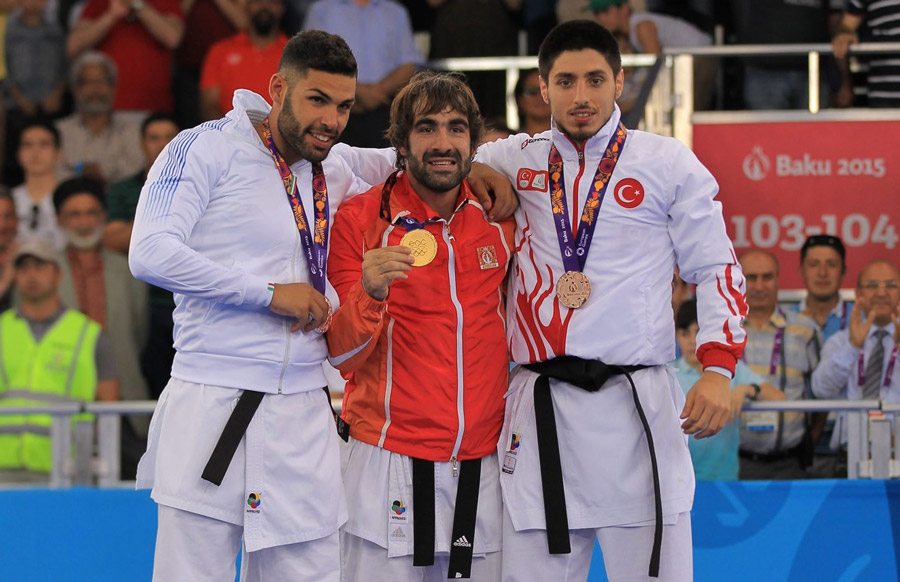
Rafael Aghayev was recently interviewed by the magazine news.day.az and generously shared some of the secrets to his success. The interview was originally recorded in Russian by Emin Aliyev and Kamalya Aliyeva and has been translated into English by Maria Morgunova.
I became world champion in 2006 and again in 2008, then twice more in the 70 kg weight category and in the open weight category, among sportspeople weighing between 70 and 100 kg. I then won once again at the championships in 2010, and for the fifth time in 2016. If I had won at the 2012 World Cup, I would have already been a five-time world champion four years ago. Unfortunately, it didn't happen because I lost to the Italian athlete Luigi Busa. I spent seven months preparing for the tournament, during which time I changed weight from 82 kg to 68 kg, and then up to 75 kg. I trained five times a day which, generally speaking, is a lot. It is better to train twice or a maximum of three times a day. But I underwent physical training in the morning, then karate, then I would sleep and rest, then again I would continue karate training and conditioning. The fifth training was dancing. I would get dressed up and dance because this is also a kind of training.
The judges gave preference to the Italian athlete (Luigi Busa). He was declared the winner and began to dance in front of me for about 30 seconds. It didn't feel good, and it caused me to close myself in for the next six or seven months. That was a great lesson for me, and I will not forget this fight until the end of my days. I sometimes review my fights on YouTube, and this fight is one that I simply can't watch: it is too hard. However, I took my revenge. In total, we competed nine times. Of those, Busa won two fights and I won seven.
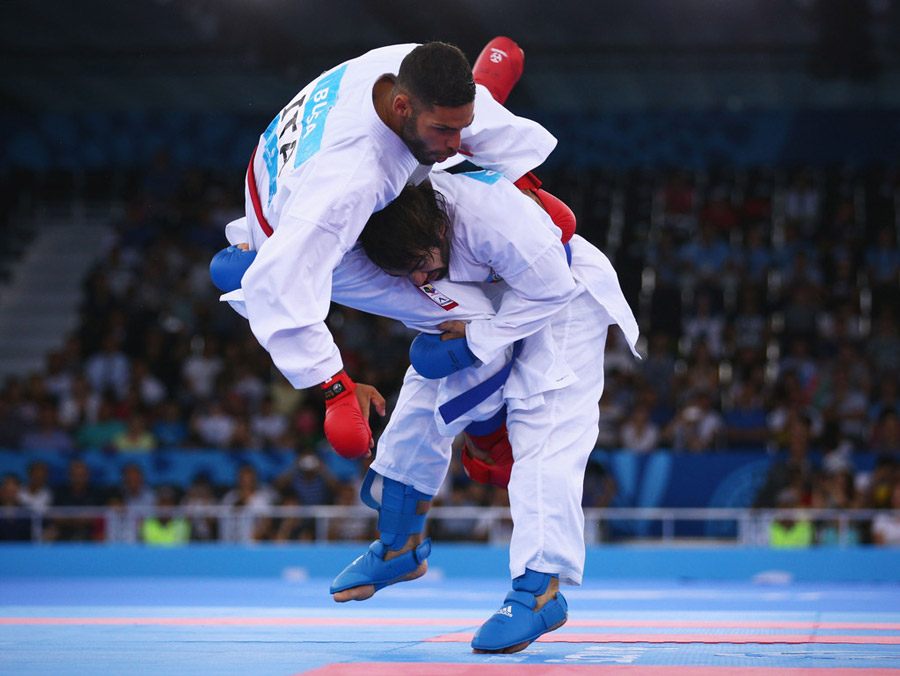
People asked me why I didn't dance in front of him. The answer is simple: I did not need to. After his victory, I raised his hand. Karate is a sport: today I'm winning, and tomorrow someone else will win. It is more important to maintain my respect on the tatami and beyond.
Italian athletes tend to do the same in karate as they do in football. In football, if they score one goal, they will stall for time for the next 90 minutes. They demonstrate the same behavior in karate. The Italian athlete will hit one time and then play chicken with their rival for the last three minutes of the fight. For this reason, when competing against an Italian athlete I always try to earn the first point.
I never chose a nickname or anything like that, but people eventually did it for me. The President of the World Karate Federation (WKF), Antonio Espinos, once called me a "diamond", and another time called me "Maradona of karate". Being an athlete, I do have an appreciation for myself, but I would never call myself "great". Of course, if I looked at myself from the view of an outsider then yes, I would have to say that Rafael Aghayev is a great one. Why? Because, according to the WKF, Azerbaijan has only ever had one karate champion, and that's me. I have a lot of respect for everyone else, but if you look at the situation realistically, then there are many world champions in my country in other sports, but in karate, there is only me. The vice-champion in Azerbaijan is Shahin Atamov.
Many people say to me, "Rafael, you are 31 years old, it is time to stop." However, I believe in myself, I believe in my mind, and in my character, and in my desire. I became the world champion for the fifth time and I do not want to rest on this achievement. I want to earn new medals and listen to our country's anthem many more times in different countries of the world.
As a person, an athlete, and a professional, I would like to say that if God will allow me, then I will not only participate but I will win gold at the 2020 Olympics in Japan. First, I need to win a license to participate in 2018. To do this I will have to win points, and I have already planned a list of tasks I need to do. As long as I have no injuries and nothing else happens, if I'm alive and I feel good, then, of course, I will wait - and we will all wait for the moment when the flag of Azerbaijan will fly at the Olympic Games.
If it works, then I want to become the world champion for the sixth time.
I never considered karate as a job like other athletes. For me, karate is my life. It is in karate that I started to take my first steps, and I will stay in the sport until I die. It does not matter if I am the head coach or not. For me, the sport of karate is like blood flowing through my veins.
Believe it or not, for the last two to three years I have been considering opening my own karate school. Of course, this is not easy. I will need good people who are willing to help me. But even if I cannot find help, I will open it anyway, because this is my long-cherished desire. This year I realized that I really do want to open a school in Azerbaijan. You know, parents often ask me via Instagram about training, but so far, I do not train, although I want to see our young athletes performing and winning not only on my level but also on a higher one. So, why not? Sooner or later I will open my school. I want to be there to see our athletes becoming champions when I am older.
Who will be next after me? I will say this, it will not be "Rafael the second". It is easy for people to say, "Sometime it will be necessary to leave the tatami". But believe me, this will be the biggest stress for me. Maybe one day someone will be better, but in the next 10 years, no one will beat my record, because the world championships are held every two years.
All my victories are valuable to me in their own way, including the finals of the world championships, and the victory at the European Games. Why the Euro Games? I would like to tell you the story about that one. Just two or three days before the start of the tournament, our President, Ilham Aliyev, visited the village of the athletes. He met with the teams and allowed the teams to take photos. But when it was time for the President to meet with the karate athletes, I hesitated. When I came closer, it turned out that the rest of the team had already lined up around our President. I got up quietly and made to move aside, as there was no place left for me, but the President called me and said, "I'm waiting for you to get the gold. Win and we will take another photo". It was a great responsibility. I am used to winning everywhere, but these competitions took on a greater importance. I couldn't imagine losing in my homeland and not keeping my promise to our President. But, thank God, I became a champion again. I won while the President of Azerbaijan watched the final fight, and then we took a picture together again. We both kept our promises.
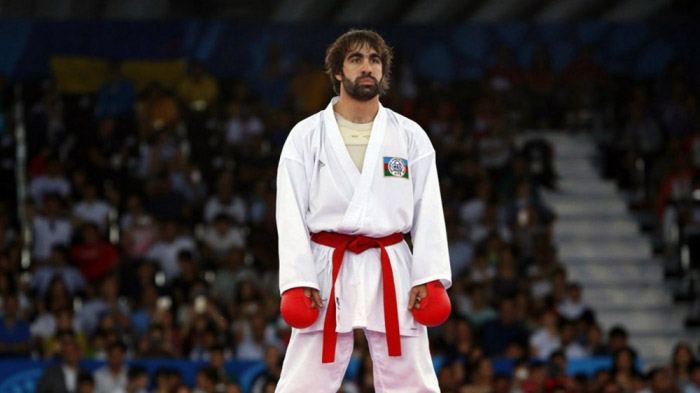
The secret to my success is my simplicity, my character, and my heart. From the point of view of sports training, the most important asset of any athlete is their mind. A professional athlete must be smart. After all, there will always be someone who will be faster than even Bruce Lee, but what good is speed if there is no mind?
My secret is that I work incredibly hard on myself and I have sacrificed even more. If my competitors go for a run at 7AM, then I go out at 6AM. If, after training, my rivals go out to have fun, to eat and to drink, I do not go. Some athletes smoke hookah, but I have never even tried it.
I am still an average person. If I have a rest I like to watch football, watch movies, and have funny conversations with my family and friends. I wake up in the morning, but I do not eat breakfast. After training, I have my lunch, and then I will relax for 30 minutes to an hour, or even watch a movie. There is nothing too special. Sometimes I go to bed at 3 or 4 o'clock in the morning.
I would say that football is my second favorite sport after karate. In 2004, I even considered leaving karate to play football, because I am so interested in it. Since 1994 I have been a fan of the Italian, Juventus. My father played football for 25 years, but I chose it as a hobby with karate as my profession. There are many football stars including Maradona, Ronaldo, and Messi. But in karate, Rafael Aghayev is the only one. I have no regrets about my choice.
My father was a football player. However, he brought me to the karate club because it was my choice. He said to me, "Let's go wherever you want". I am forever grateful for this.
At my first karate training, I was beaten by the coach. I am grateful to all my teachers, and I bow to them in appreciation for what they do for me. At the same time, this story is about building character. I was just a kid, and the coach beat me with a skipping rope. It was very painful, and I cried a lot. Dad asked me if we were signing up here, or if I wanted to leave. I replied that we should sign up. I was just six or seven years old. My father - although he was a football player - helps me a lot with my karate training, both physical and tactical.
I do not know who I would call my main teacher, because all of them are amazing. I am grateful to my coach Rafael Mamedov, who took me by the hand and taught me the alphabet. I'm also grateful to Fizuli Musaev and many others. Sometimes it may seem that a coach doesn't see something, but in fact, they just turn a blind eye to it for whatever reason. The coaches told me that after the first family, they are my second one. And it is true. We are always together at the training campus, we spend more time together than we do at home, and they come to know us like their own five fingers. I thank them all and bow to their efforts and the work they have dedicated to us. Thanks to God, we have achieved excellent results and our victories are a response to the efforts of the coaches. This is a great honor for me.
I wasn't a good student at my public school. I got excellent marks only for physical education and handiwork. Even my music discipline was bad. Frankly, when I was a child, I just fought. I skipped school and did not study. I was so annoying that my teachers eventually said, "Rafael, just sit still for five periods, do nothing, but just sit down and don't talk." In return, they gave me a C, and I thanked them for it. My parents asked me to stop fighting, to sit quietly in the class, and they accepted my C grade. All they asked was that I never give up the sport. I have two brothers, and I am the youngest in my family. My brothers both studied very well and were always reading books. However, I earned my degree before them.
Karate is a special sport because the more you study, the more you need to learn. I teach a lot of seminars in different places. I was very proud when my Japanese colleagues invited me to visit Japan, where karate was born.
I would suggest that parents allow their children to choose any sport they like. If your child chooses football, let them learn it. If they are already training, my advice is to not worry about anything and simply enjoy the sport. It doesn't matter whether you choose karate or anything else. Let your children play a sport for their own health. And if he or she shows good potential, the coach will begin to work with the child and uncover their talent step-by-step.
My father once told me, "Rafael, do not think about your friends, do not think about girls, do not think about money and cars. If you are the best, friends and girls will find you, and you will get money and cars. Just be the best in your business."
My message to the world is to be the best you can be and to ask God for help. Whether you are a journalist or an athlete, it doesn't matter. Just be the best.
Athletes and Coaches Should Be Supported
Unfortunately, many people do not understand that it is not enough to be a talented and hard-working athlete. Everyday people expect Olympic athletes to bring glory to their country without ever thinking that these athletes need to be supported financially. Unfortunately, the same thinking holds true at the government level. Usually, funding is based on potential medals and nobody gives a second thought to coaches who shouldn't be asked to work as volunteers or babysitters.
The current funding for Olympic athletes should be reviewed and corrected. Hopefully, by the time the 2020 Tokyo Olympic Games begins, we will see North American karate athletes proudly competing under the flags of their home countries.
If you are interested in knowing more about the real cost of raising a karate champion in Canada, please see the documentary feature film, "Karate in Ontario: The Uphill Battle - the Cost of Raising a Champion." An educational film, "The Uphill Battle" looks at the sport of karate in detail, including the process of creating karate champions, the benefits of the sport, and the uniqueness of the practice.
You can view official trailers here:
Watch the documentary for free at Amazon Prime.
Purchase your own copy of the documentary on DVD or BRD.
Finally, please like our Facebook page and write a review if you enjoyed the documentary.
Resources:
- https://www.theatlantic.com
- https://www.theodysseyonline.com
- http://www.1news.az (Russian language)
- https://news.day.az (Russian language)
- http://www.karate.ru (Russian language)
- http://aghayev.pro (Russian version)





